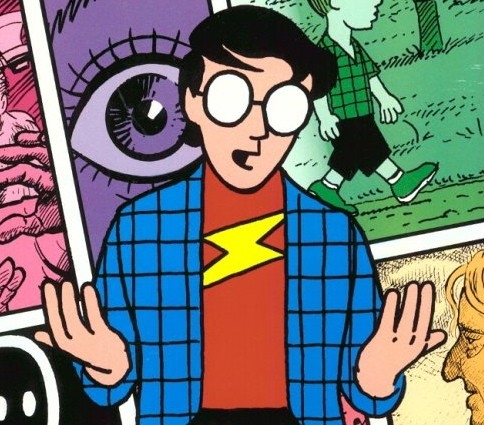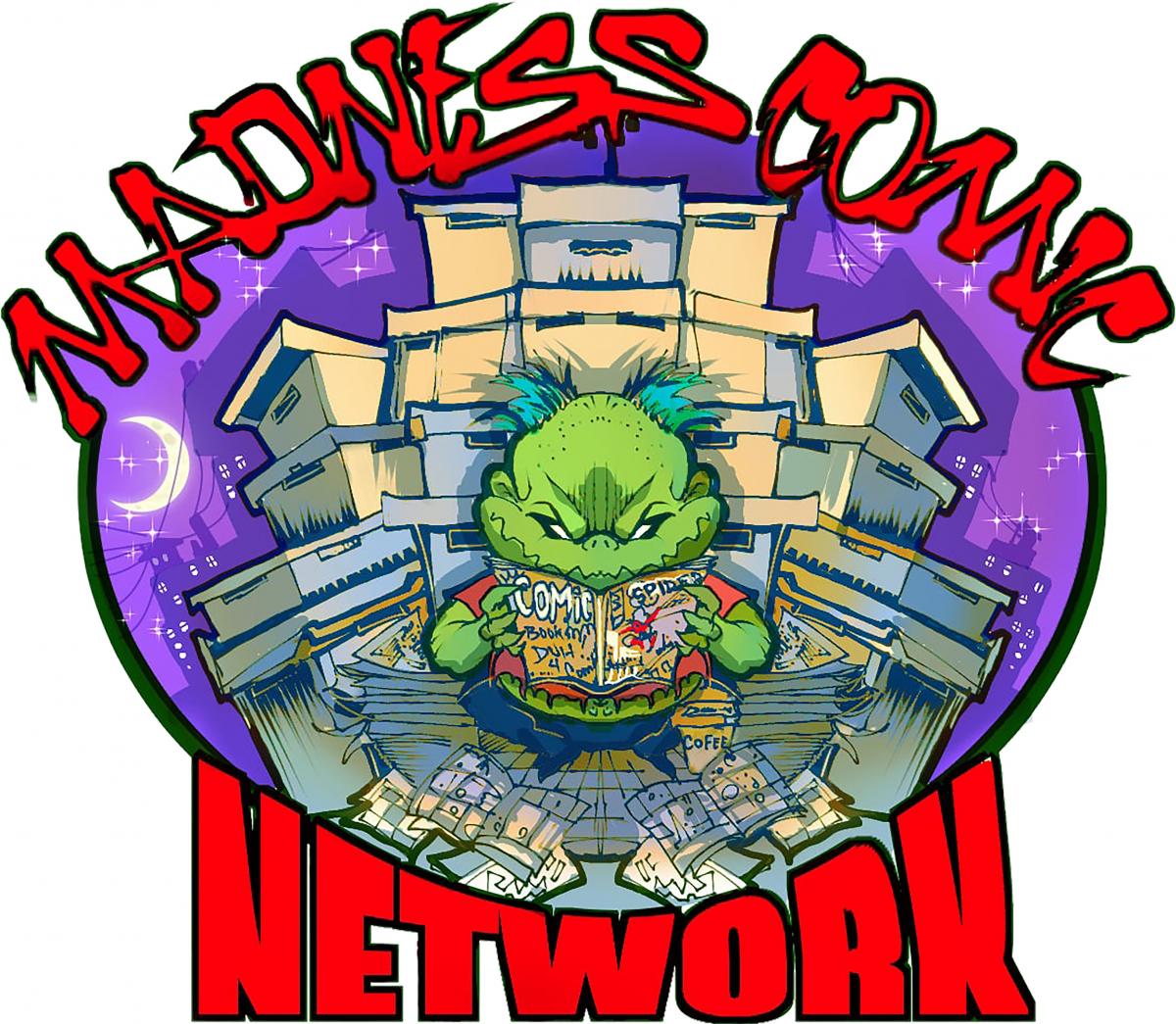You are here
Home ›Scott McCloud: A Deeper Understanding
FTC Statement: Reviewers are frequently provided by the publisher/production company with a copy of the material being reviewed.The opinions published are solely those of the respective reviewers and may not reflect the opinions of CriticalBlast.com or its management.
As an Amazon Associate, we earn from qualifying purchases. (This is a legal requirement, as apparently some sites advertise for Amazon for free. Yes, that's sarcasm.)

Scott McCloud is the creator of Zot! and the author of the incredibly informative book, Understanding Comics, a sine qua non for anybody interested in getting into the field, or for someone who just wants to learn what makes the medium so dynamic. I had the opportunity to chat with Scott about his take on the Internet and web comics, and also talked about his newest book, Reinventing Comics.
The comics scene has undergone considerable changes since the advent of the Internet. Has this altered the way we should understand comics today?
I think the Internet is capable of completely changing the way comics are created, the way they're distributed, and the way they look; and yet, the most fundamental aspects of comics still apply. A lot of what I wrote about in Understanding Comics still applies to comics as I see them growing on the Internet. This idea of what the mind does between panels, how we connect those different moments, the different kinds of transitions, the effect of different kinds of imagery on the reader--all of these things are equally relevant online as they are in print, even though the way I see comics changing online is really quite radical. They may not look much like the comics we know in print when the transformation is complete, but they'll still have the same heart and soul as far as I'm concerned.
A lot of people are talking about comics and books moving toward the web. Do you foresee the public--and especially the comic fans in general, who tend to be a rather "packrat"-ish lot, like myself--giving up the tactile sensations in favor of the electronic?
I don't think that anyone ever completely gives up something that they grew up loving. Paper and ink brought us a lot of wonderful things over the course of our lifetimes--and I include myself in that group. I have plenty of reasons to be grateful to paper and to have sentimental attachments to paper because so many of my experiences with art and literature came through that medium. But I think that love is one of association. If it were pieces of granite or tree bark or aluminum that was delivering those experiences, I think we'd have those same feelings about them.
I'm imagining a bunch of ancient Egyptian teenagers saying, "Papyrus? What, no more carved hieroglyphics? No way!"
Exactly! We do have examples of other societies that depended on other means to transmit ideas, and those means were just as beloved. In fact, go back far enough and I'm sure that anything short of a deep bass voice by a campfire would be considered inadequate to tell a story.
But although our generation grew up without any sort of computer mediated communication, I think we may be one of the last that doesn't have an equally special place in its heart for that glowing rectangle in the living room or in the bedroom.
If you see a particular favorite comic on the web, should you download it right then if you want to reread it later?
Well, of course the idea of purchasing and owning a comic falls into a couple of basic groups. One of the benefits of owning a comic is to hold it; to fee like, "Yes, this is mine," and to have that tactile sensation. That, I don't think, is as important to us as the other, which is access--the idea that I can now read it any time I like.
Once there is a means by which creators can charge very small amounts of money for access online, then there will be an enormous incentive for them to keep those works available in perpetuity. At that point, availability really is no longer the issue. We purchase things because we're afraid they're going to go away; that they won't be on the shelves next week or next month; that we won't find them in the back issue bin. But if they're always out there on a server somewhere in Arkansas or Taiwan or Florida, then it's not as important that we download and have it. Nevertheless, I think that probably selling comics on the web--that is, electronically delivered comics--will probably fall into the two groups: one where you pay to download the work, and one where you pay a smaller amount to access it one time.
Anybody can subscribe to an ISP, reserve a domain, and begin putting her comics on the web. How does an artist make the ultimate conversion from pixels-on-screen to pennies-in-pocket?
Well, the conversion hasn't happened yet. I think it's very important that we understand that the new economy that I'm talking about still doesn't really exist. You can sell three types of things on the web: you can sell atoms, you can sell bits, and you can sell eyeballs. So far, people are only selling atoms and eyeballs--that is, they're only selling physical products or advertising. Selling what you actually get on the web is a very new concept because, for years now (and this is still true for many users) users are not prepared to pay for content on the web because they feel like they are already paying with their time; it takes so long just do download the bloody things.
But that's a temporary situation, and we're already beginning to see a change in that attitude with things like downloadable music. The problem is that we need a form of transaction that allows us to charge very small amounts of money. Downloadable music sites--those that do charge--are charging like, a dollar. I think that's way to much to charge for downloading a song. It should be more like ten cents. Because when you cut out that army of middlemen, there's no reason you should still be paying the same amount you were paying before. You should be paying about a fifth of that amount, maybe. Because the producer--that is, the actual creator of the work--is only getting, in almost all fields--records, print, moviemaking--about a tenth of the consumer's dollar as it is. If they have the potential to get 90 percent of the consumer's dollar, I think they should split the difference. I think the consumer shouldn't have to pay nearly as much. At that point, the consumer has much more buying power, and is much more motivated to buy more. Imagine if tomorrow you woke up and music CDs were suddenly $1.50. How many more would you buy?
A lot of the web comics today tend to be little more than scans of standard comics; sometimes they're animated in the old 60s Marvel style. What facets of web publishing should artists be taking advantage of that are specific to the web? I'm thinking specifically of the comic strip biography on your own site, which was set up like a chesboard; that's something that you couldn't really pull off in a paper medium.
That actually gets to a couple of different issues. First, let me just say that obviously we have a long way to go, and most people are still putting up pages that are upright rectangles. Come on, guys, look at the screen! It's a sideways rectangle. If you're going to treat the screen as a page, at least notice what shape it is. That's number one.
But beyond that, far, far beyond that little technical problem, I think it's also important to remember that the screen can be treated as a window as well as a page. I much prefer the window idea, because I think the constricting qualities of the printed page are actually one of the things about print that we would do well to get beyond. If you have a thousand-panel story, is there a way that those thousand panels can all be laid out in one immense landscape of time?
Now, obviously I'm a little ahead of the curve on that one, because right now, with the web as it is, with download speed as it is, with processing power as it is, that's not really practical. However, it is practical to at least go beyond the six or eight a page, and to do say, a twenty or twenty-five panel strip that's all one long scroll.
Scrolling is a bit of a dirty word in web design, and I think with good reason. Most computers scroll in a kind of herky-jerky, every ten pixels sort of way. It's very hard on the eyes. But we have to be careful to separate out those drawbacks that are intrinsic to the medium and those which are just a matter of technological circumstance. I think that hard-on-your-eyes scrolling is a technological circumstance; it's something temporary. I think it's worthwhile to think just a couple of years down the road to when that's a more pleasurable prospect, to see what is it that we can do with that expanded canvas.
You're new book, Reinventing Comics, deals quite a bit with moving comics to the Internet, doesn't it?
It's 242 pages long, and it has about 120 pages just about comics and computers. So yeah, a big chunk of it is that.
I have a friend who considers Zot! as definite desert-island reading material. Any plans to return to that series?
First, of course, we want to see if we can reprint those last several issues. I'd like to do that very much. We'd gotten three out of four volumes done, but unfortunately Kitchen Sink Press went under. I do like the idea of getting back to Zot!, although every time I returned to Zot! before, it was alwayst to sort of reinvent the series, to do something very different with it. That may also be true this time around.
Would it be a paper Zot! or would it be a web Zot!?
I don't know. That's the big question, isn't it? I couldn't say for sure.


